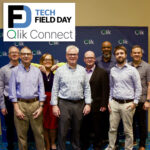|
|

Michael Bronstein and Nick Magnuson and Stephen Foskett presented for Qlik at QlikConnect25 |
This video is part of the appearance, “Tech Talks at Qlik Connect 2025“. It was recorded as part of Tech Field Day Experience at Qlik Connect 2025 at 12:00-5:00 on May 14, 2025.
Watch on YouTube
Watch on Vimeo
At Qlik Connect 2025, Stephen Foskett interviewed Michael Bronstein, DeepMind Professor of Artificial Intelligence at the University of Oxford, and Nick Magnuson, Head of AI at Qlik, explored the transformative potential of agentic AI in science and enterprise. Bronstein highlighted how agentic AI may represent a seismic shift in the scientific method, moving beyond traditional roles in simulation and prediction to now participating in creative hypothesis generation—a realm historically reserved for human ingenuity. This evolution positions AI as not just a tool but a fellow innovator, potentially capable of reaching milestones like Nobel Prize-worthy contributions. While the impact in experimental sciences faces challenges due to the messiness of real-world labs, fields like mathematics and software development—where elements are inherently digital—might more quickly benefit from AI’s capabilities.
Magnuson elaborated on Qlik’s role in enabling agentic AI across industries through scalable analytics and data infrastructure. Qlik is actively working to address the complexity of querying massive data lakes, especially as AI systems demand broader, multimodal, and high-velocity datasets. This adaptation aligns with the shift towards machine-centric data generation and processing, emphasizing how data and AI models must evolve in tandem. Magnuson also noted that synthetic data is increasingly prevalent and necessary for training AI agents capable of exploring previously unapproachable scenarios at scale. Nonetheless, challenges connected with the trustworthiness and verification of such data remain critical.
The interview concluded with a discussion about the deeper implications of agentic AI creating new paradigms in both science and enterprise. Bronstein suggested that scientific data collection itself may need to evolve, moving towards formats interpretable by AI but potentially opaque to humans. Meanwhile, Qlik’s innovations aim to support this transition by developing infrastructure capable of handling such complex, varied, and massive-scale data input. As the use of agents grows, particularly in autonomous exploration and decision-making, enterprises must not only consider technical capabilities and applications but also ethical and regulatory implications. These developments advance the broader conversation about co-evolution between AI and scientific inquiry and reaffirm the necessity of continued, rigorous interdisciplinary collaboration.
Personnel: Michael Bronstein, Nick Magnuson, Stephen Foskett









